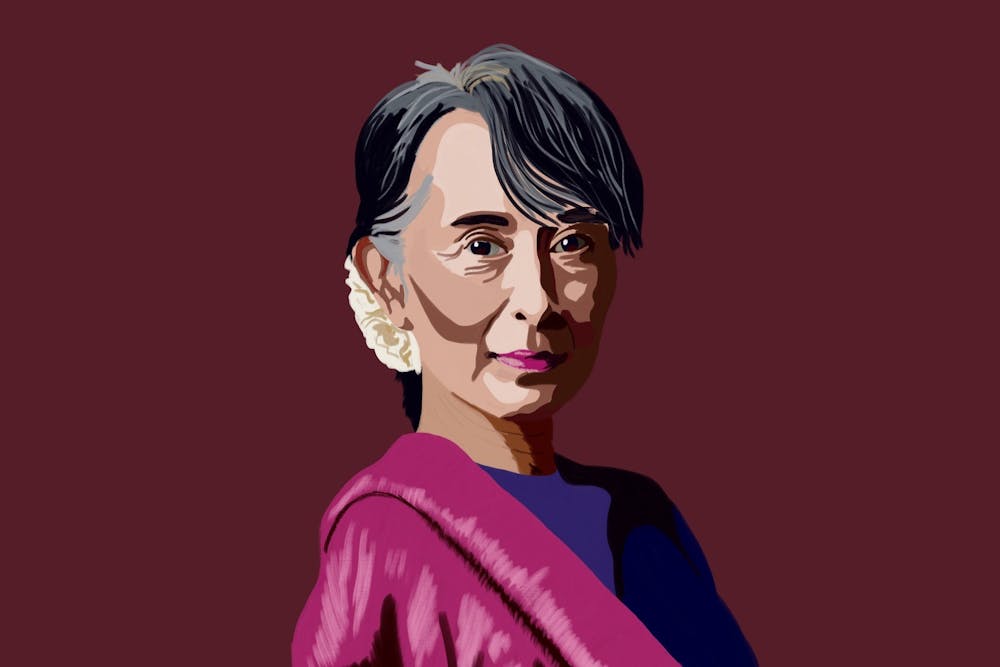Editor’s Note: The views and opinions expressed in this article do not reflect those of The Collegian.
Since 2011, the world has watched Myanmar shake off its past of military rule and embrace a democratically elected government, but just a few weeks ago, rolling military trucks and soldiers’ rapid footsteps suddenly broke the tranquility.
On Feb. 1, the military junta seized control of the country in response to a landslide election victory by the National League for Democracy, headed by Aung San Suu Kyi. A committee of high-profile Myanmarese military leaders, clearly dissatisfied by the election result, claimed election fraud and used that to justify its takeover. This action essentially put the nation back into the state of military rule, under which it had been for almost 50 years, from 1962 to 2011. Suu Kyi, the symbol of democracy in Myanmar, was also under arrest.
International condemnations have immediately followed. The United Kingdom, European Union and Australia have all condemned the military takeover. The newly elected president of the United States, Joe Biden, is also threatening a possible resumption of economic sanctions.
According to Britannica, Suu Kyi’s father, Bogyoke Aung San, is considered to be the father of the modern, independent Myanmaese state, having led the Anti-Fascist People’s Freedom League to victory in the 1947 Myanmases general election. He was assassinated shortly after. Suu Kyi has inherited a keenness for political aspirations from her father. After her return to Myanmar from Britain in 1988, she immediately led the democratic reform movement against the military junta, which was in power at the time.
Going up against the status quo made Suu Kyi pay a heavy price -- she was put on house arrest for almost 20 years between 1990 and 2010. Her suffering was not fruitless, however. Under pressure from repeated popular protests demanding reform, the military junta eventually agreed to hold democratic elections in 2010, and subsequently released Suu Kyi. She quickly rose to leadership, leading her party, the National League for Democracy, to victory in 2016 and remained in power up until Feb. 1.
However, Suu Kyi’s eventual political downfall was foreshadowed from the start, even when it seemed that the military junta had made great concessions in response to Suu Kyi’s activism. In reality, Myanmar never truly went through a democratization process, and the military junta never truly let go of its power.
The military junta merely adopted a more covert way of exercising its power through various political clauses, economic leverage and infiltration into civil assemblies. Through those measures, the junta essentially maintained its power while creating an illusion for the public that it had conceded. Suu Kyi and her party were treading on thin ice since their victory, and that ice clearly broke in February 2021.
The current constitution of Myanmar, which was drafted in 2008 by the military junta in response to rising dissatisfaction against arbitrary military rule, states that three-fourths of both the House of Nationalities’ and the House of Representatives’ votes are needed for a constitutional amendment to pass. However, the military junta wields power to directly appoint one-quarter of the seats of both assemblies.
Moreover, the junta installed a puppet party called the Union Solidarity and Development Party into the assemblies, strengthening its direct influence. On top of the one-quarter of the seats that the military junta are able to directly appoint in both assemblies, a constitutional amendment that is not approved by the military junta can never successfully pass.
Additionally, the military junta formed the National Defence and Security Council, which possesses the power to declare a state of emergency. After such a state is declared, the assemblies are immediately dissolved, and the military will wield temporary control over the government. In fact, before the current coup, the military arbitrarily declared a state of emergency, thereby justifying its actions to dissolve the assemblies and arrest high-profile governmental officials, including Suu Kyi.
The military junta also formed the Myanmar Economic Holdings Ltd. (MEC) and the Myanmar Economics Limited Inc.(MEHL), two companies that wield nearly monopoly control over the finance, petroleum, natural gas and jewelry sectors in Myanmar, all of which are Myanmar’s most lucrative industries (4). Those two companies not only provide the military junta with abundant funds but also indirectly provides it with powerful political leverage and bargaining power.
Enjoy what you're reading?
Signup for our newsletter
In short, with tight control over the political and economic scenes, the military junta essentially created an illusion of democratic reforms when it seemed to make great concessions. However, regardless of how many measures the junta took to solidify its grip, it could not stop the people from becoming aware of the situation.
In the weeks since the coup, major protests had broken out in Myanmar, demanding the release of Suu Kyi and reestablishment of both assemblies and a civil government. So far, the military junta has imposed a strict crackdown on the protesters, resulting in at least 38 deaths. Whether this will quench the protesters’ fervor and scare them into submission or motivate them to take even greater measures remains to be seen.
Contact opinions writer Jack Zhang at jack.zhang@richmond.edu.
Support independent student media
You can make a tax-deductible donation by clicking the button below, which takes you to our secure PayPal account. The page is set up to receive contributions in whatever amount you designate. We look forward to using the money we raise to further our mission of providing honest and accurate information to students, faculty, staff, alumni and others in the general public.
Donate Now


